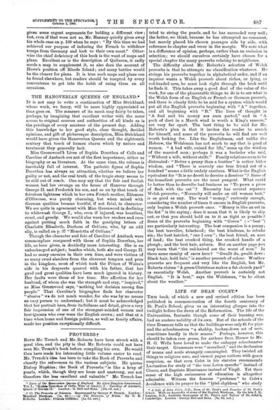PRO VERBS.t
BOTH Mr. Trench and Mr. Roberts have been struck with a good idea, and the pity is that Mr. Roberts could not have seen Mr. Trench's book before compiling his own. He would then have made his interesting little volume easier to read. Mr. Trench's idea has been to take the Book of Proverbs and classify the references to the various subjects. He quotes Bishop Hopkins ; the .Book of Proverbs "is like a heap of pearls, which, though, they are loose and unstrung, are not therefore the less excellent and valuable." Mr. Trench has • Lies of the Ham000rian.Queena of Newland. By Alice Drayton Greenwood. Vol. I., n Sop 'We Dorothea of OE,11e, Wife's:4 George L Caroline of dnsbsieh,. Queen of George IL" London G. Bell and Sons. [10s. ed..net.] —t The Prosorts of Solomon. Rearranged by Georgo-P. Trench. London : Brothers. j1s, sa..)--,--en This 1.poverlo bf jVales.- By T. B.
Roberts. London : . [ neLl
tried to string the pearls, and be has succeeded very well ; the better, we think, because he has attempted no comment, but merely placed his chosen passages side by side, with reference to chapter and verse in the margin. We note what is a difference of opinion, perhaps, rather than an omission in selection ; we should ourselves certainly have chosen for a special chapter the many proverbs relating to neighbours.
The difficulty about Mr. Roberts's selection of Welsh proverbs is that he attempts no classification whatever. He strings his proverbs together in alphabetical order, and if an inquirer wants a Welsh proverb about riches, or lying, or red-beaded men, he must look right through the book until he finds it. This takes away a good deal of the value of the work, for one of the pleasurable things to do is to see what is the Welsh form of an English or French or German proverb, and there is clearly little to be said for a system which would put all the English proverbs beginning with "A" together, and all beginning with "B." The lines of thought in "A fool and his money are soon parted," and in "A peck of dust in a March wind is worth a King's ransom," are very far apart. The best thing to be said for Mr. Roberts's plan is that it invites the reader to search for himself, and some of the proverbs he will find are well worth looking for. Like the Englishman, and unlike the Hebrew, the Welshman has not much to say that is good of women. "A bad wife, ruined for life," sums up the wisdom of the married man ; perhaps it was a bachelor who said, "Without a wife, without strife." Family relations seem to be distrusted : "Better a penny than a brother" is rather bitter wisdom, and "There is scarcely one true friend out of a hundred "seems a little unduly cautious. What is the English equivalent for "It is no deceit to deceive a deceiver" ? Some of
the homeliest proverbs are the most pungent. What could be better than to describe bad business as "To pawn a piece of flesh with the eat" ? Necessity has several separate Welsh proverbs ; "Necessity will make an old woman trot," is as good as any. The word "money," curiously enough, considering the number of times it occurs in English proverbs, only begins a Welsh proverb once. "Money is like an eel in the fist" is the saying ; does it mean that it is likely to slip out, or that you should hold on to it as tight as possible ?
Some of the proverbs beginning with " Goreu " (=" best ") are particularly interesting. The best companion is a penny; the best traveller, falsehood ; the best kindness, to rebuke sin ; the best hatchet, "one I own " ; the beat friend, an acre of land ; the best crooked thing, the crooked handle of a plough; and the best hair, auburn. But on another page you may learn that "the red-haired are the worst of men." Is there some enmity of races here ? "Gwent du, gwallt dewr : Black hair, bold hair," is another proverb of colour. Weather proverbs are frequent and very like the English, but Mr. Roberts claims "A green Christmas makes a fat church yard" as essentially Welsh. Another proverb is certainly not English. "It is best," says the Welshman, "to be silent about the weather."


























































 Previous page
Previous page